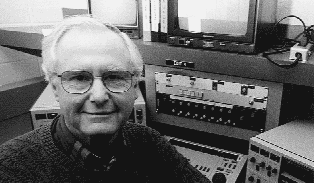Don Oliver Reports Back
by Joyce H. Brusin
|
 |
| Don Oliver '58 brought three decades of broadcast news experience back to UM this year. |
In thirty-three years as a broadcast journalist in radio and television news, Don Oliver '58 reported on conflicts in Southeast Asia, the Exxon-Valdez disaster in Alaska, Egyptian-Israeli peace talks and political conventions in the American heartland. No matter how far he roamed, however, the Billings native was always glad to return to his home state. When he turned to environmental reporting in the '80s, Oliver covered stories in Montana whenever he could. He brought issues such as clear-cutting in national forests, the acquisition of new wilderness areas and the infamous Berkeley pit in Butte to the attention of the NBC News national audience.
Every chance he got in those years, Oliver returned to visit his alma mater. "I have an association with the University that transcends being an alumnus," Oliver says. "I've kept in touch, returned regularly at Homecoming and have known most of the deans [of journalism] over the years." Last summer, Interim Dean Joe Durso asked Oliver if he would consider teaching fall semester. Though other commitments initially made Oliver hesitant, when Durso died suddenly, Oliver decided to come back to teach what he knows best. "I got a good education here," he says. "I felt I wanted to pay something of that back."
This fall Oliver taught a senior seminar for print journalists in ethics, standards and practice, as well as a beginning broadcast writing and reporting class for sophomores. Montanans have shared in the fruits of his third class, Broadcast Newsroom I, by tuning in to the program "Montana Journal," broadcast on Montana Public Television in November, January and February. Students produced documentary segments for the program on the Montana economy, the state's working poor, the National Bison Range, shelters for victims of domestic abuse, violence in Montana schools and the prostitution museum in Butte. "The program is a mix of hard news and features," says Oliver. "The students get practical experience on the air. With advice from faculty, they write, shoot and edit everything."
When Oliver graduated from UM, television news was still in its infancy in Montana. His first job at KXLJ in Helena allowed him to write copy and announce while catching up on the technical innovations of the day. He moved on to other stations in the West before accepting a scholarship from NBC News to attend the prestigious Columbia University Graduate School of Journalism. After graduating with his master's degree in 1962, Oliver returned to broadcasting as a principal newscaster or news director for network affiliates in Washington and California. In March 1966, NBC asked Oliver to join its Cleveland bureau and cover the American Midwest.
Oliver covered peace marches, civil rights marches and the 1968 Democratic National Convention in Chicago before moving to Tokyo in 1973 to spend two-and-a-half years covering conflicts in Laos, Vietnam, Korea and Cambodia. In 1985, in the middle of the decade he devoted to environmental reporting, Oliver received UM's Distinguished Alumni Award. Before leaving NBC in 1991, he covered the Persian Gulf War from American military bases in Germany.
Since then, Oliver has served as a consultant for newsmaking organizations looking for better relations with the media. "I teach them how the media work and what their responsibilities as newsmakers are versus the responsibilities of the reporters covering them," he says. Oliver returned to television news briefly in 1996 for a four-month stint at MSNBC.
Having had an opportunity to watch his profession grow since the '50s, Oliver believes that the biggest change in television news results from the increasingly complex technical capabilities. "The technology exists to provide live coverage from anywhere in the world, but the rush to be first on the air with that coverage has robbed television news of its ability to reflect," he says. "The opportunities that television presents to meld pictures, sounds and images together to tell a story are being squandered. The amount of raw information available has greatly increased, but it's questionable whether the medium of television is being used to its best advantage."


|